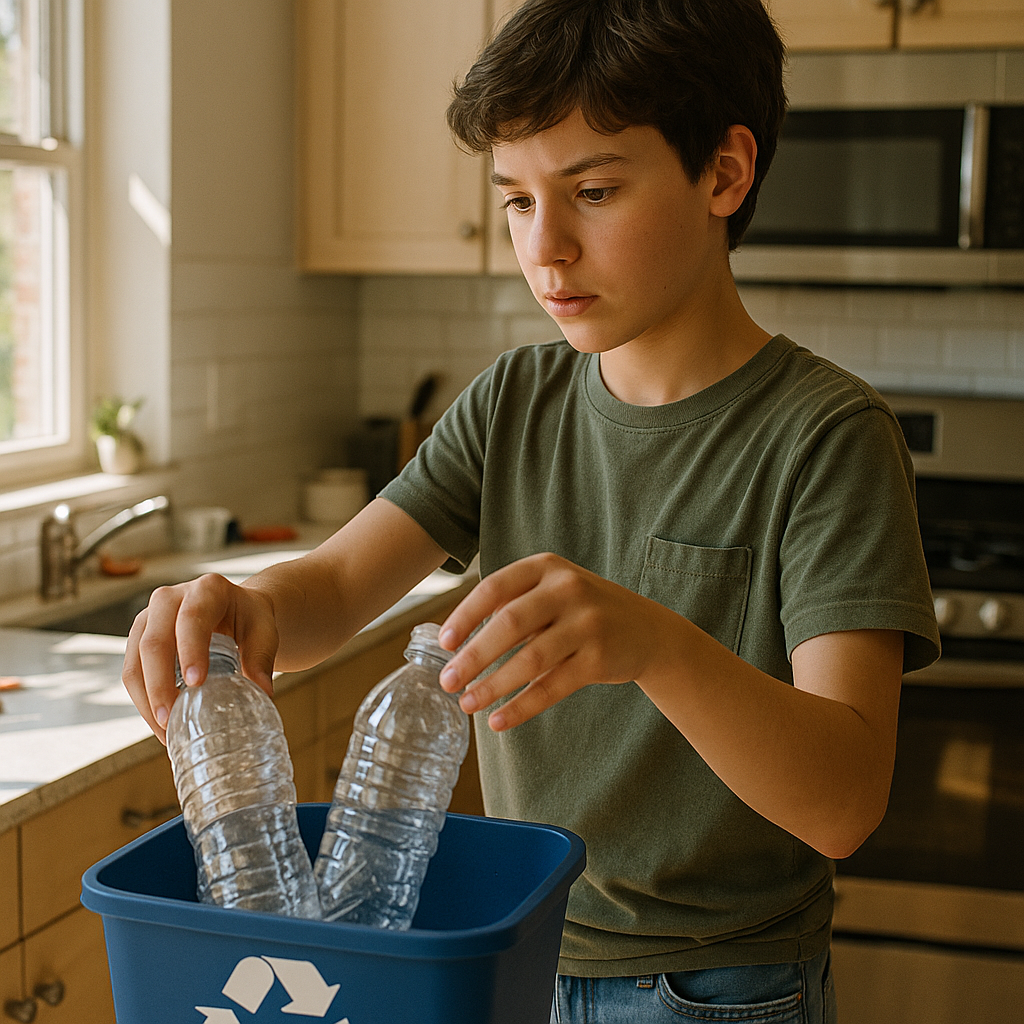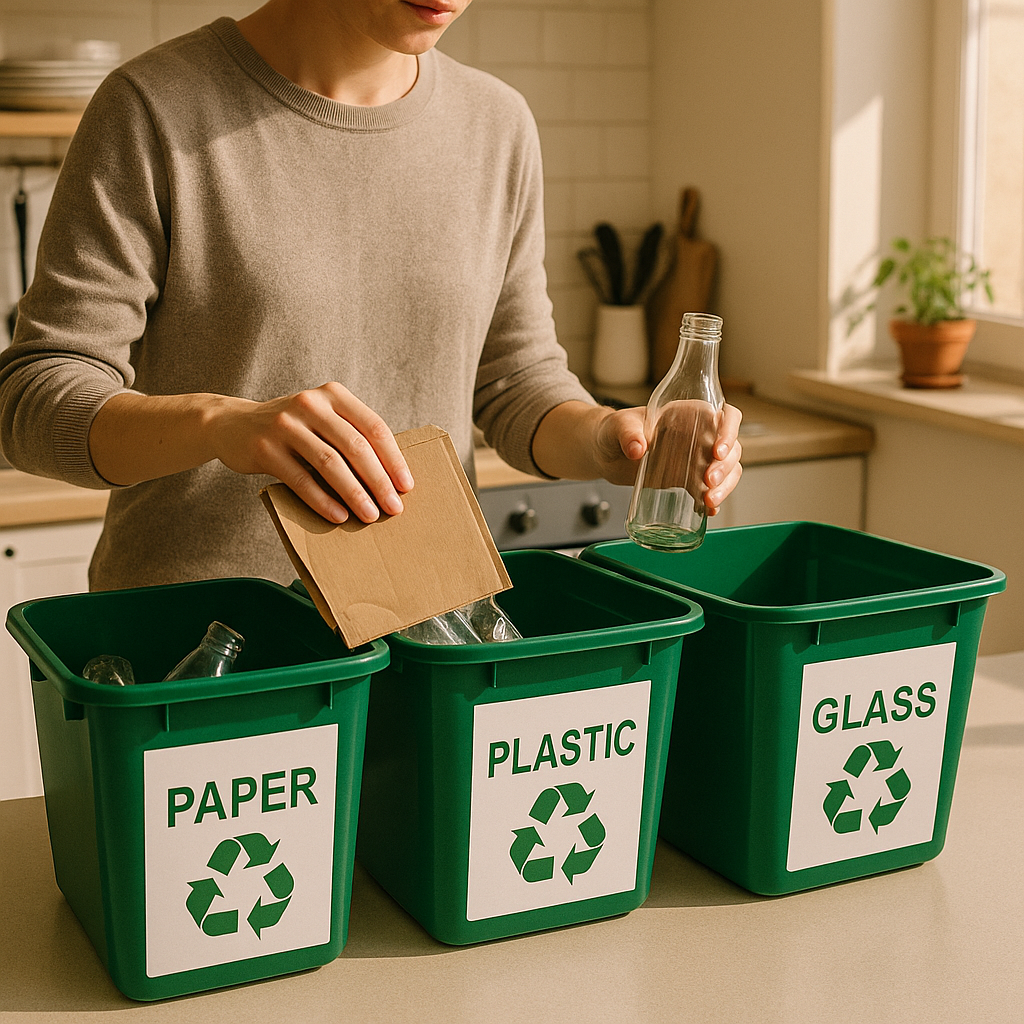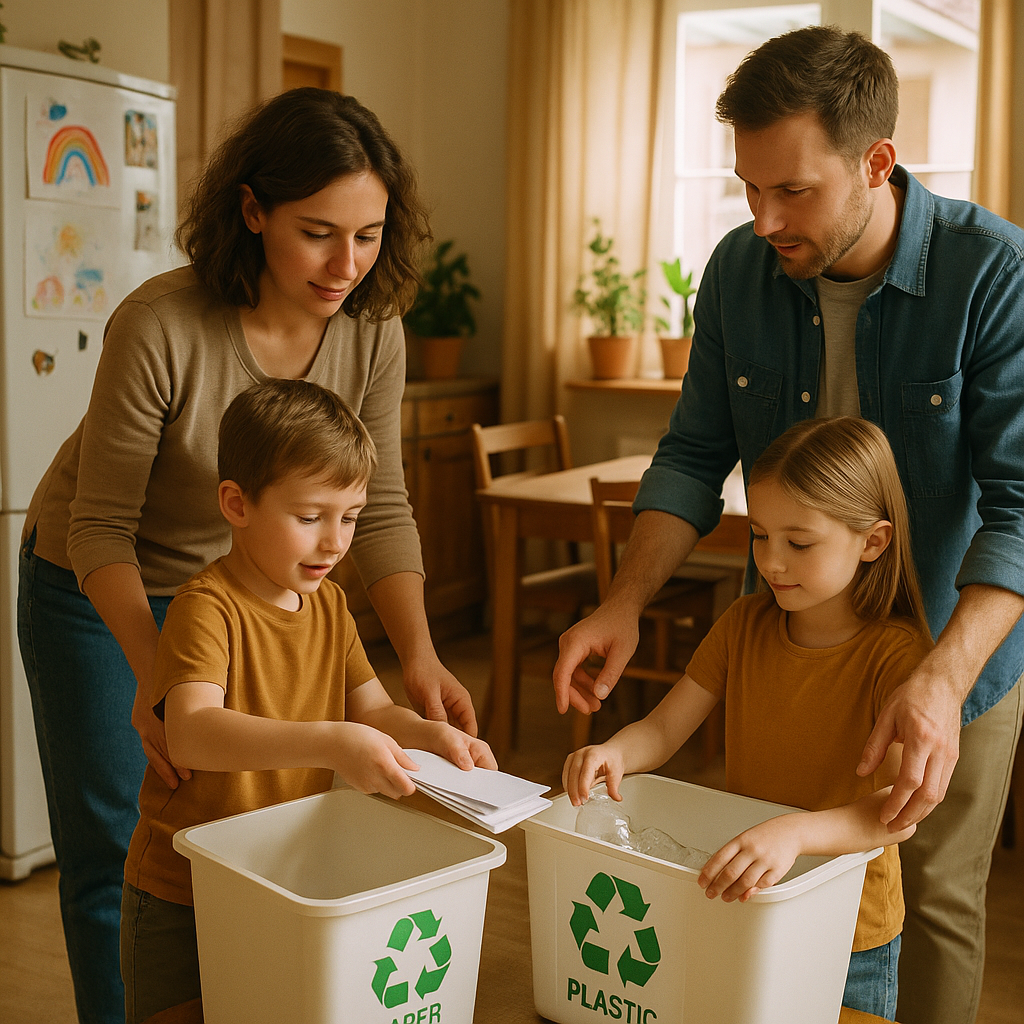5901 Botham Jean Blvd, Dallas, TX 75215
What is Recycling 101: A Beginner’s Guide
June 20, 2025Every day, Americans generate about 4.9 pounds of waste per person. This substantial figure underscores why recycling is not just an environmental option, but a necessity for our planet’s future. Recycling 101 serves as your entry point to understanding this essential process.
Recycling involves collecting, processing, and transforming waste materials into new products instead of sending them to landfills. It is one of our most accessible tools for conserving natural resources, reducing pollution, and minimizing our collective environmental impact.
While the concept is straightforward, effective recycling requires knowing what can be recycled, how to prepare materials correctly, and why these efforts are important. By recycling materials like paper, plastics, glass, and metals, we not only reduce waste but also conserve energy, protect natural habitats, and actively combat climate change by reducing greenhouse gas emissions.
Why is Recycling Important for Beginners?

Recycling reduces the volume of waste sent to landfills. When beginners recycle items like paper, plastic, and glass, they prevent these materials from occupying landfill space. Extending landfill lifespan is crucial as communities face challenges with waste disposal sites reaching capacity.
Conserving natural resources is a significant benefit of recycling. When beginners recycle paper, they help save trees. Recycling aluminum cans uses 95% less energy than producing new cans from raw materials. Glass recycling preserves sand and other minerals while using less energy in production.
Recycling reduces pollution at multiple levels. By decreasing the need for raw material extraction, recycling minimizes environmental damage from mining and drilling. Manufacturing products from recycled materials typically generates fewer emissions than creating products from virgin resources.
For beginners, recycling represents an immediate, tangible action. Sorting household recyclables requires minimal effort yet delivers substantial environmental benefits. This accessibility makes recycling an ideal entry point for those new to environmental conservation.
Recycling significantly contributes to reducing greenhouse gases. Landfills emit methane, a potent greenhouse gas contributing to climate change. By diverting organic materials and paper from landfills, beginners help reduce these emissions. Additionally, manufacturing with recycled materials typically requires less energy, decreasing carbon footprints further.
When beginners adopt recycling habits, they become part of the circular economy. This model aims to minimize waste by keeping materials in use rather than discarding them. Through recycling, beginners help transform the traditional take-make-dispose approach into a more sustainable cycle of resource utilization.
Protecting wildlife is another reason for beginners to recycle. Proper waste management through recycling helps prevent pollution of natural habitats. Plastic recycling specifically reduces the likelihood of these materials entering waterways and harming marine life through ingestion or entanglement.
What Are the Basics of Proper Recycling?

Proper recycling begins with understanding how to sort materials correctly. Effective sorting involves separating recyclables like paper, plastic, glass, and metal according to local guidelines. Many recycling centers reject contaminated materials, with up to 15% of all recycled goods being rejected due to improper sorting or preparation.
Learning your local recycling rules is crucial. Guidelines vary significantly between communities, so take time to research what your municipality accepts. Some areas require separating paper from plastic, while others allow single-stream recycling, where all recyclables go into one bin.
Before recycling containers, clean them properly by rinsing out food residue from jars, bottles, and cans. Recycling centers must maintain profit margins to stay operational, and receiving contaminated materials means paying to transport them to landfills.
Proper Sorting Techniques
Sorting begins at home with clearly labeled bins. Use separate containers for different recyclables if required by your local program. Remove non-recyclable components from items, such as plastic windows from paper envelopes and plastic caps from glass bottles.
Avoid wishful recycling, which occurs when people toss questionable items in recycling bins hoping they can be processed. When in doubt, check local guidelines or dispose of items in regular trash. Mixing non-recyclables with recyclables can contaminate entire batches.
Flatten cardboard boxes to save space in recycling bins. This simple step makes collection more efficient and helps processing centers handle materials better. Keep plastic bags out of regular recycling bins, as most curbside programs don’t accept them.
Collection Methods
Communities offer various collection options for recyclables. Curbside pickup provides convenience for most residents. Set out your recycling bins on designated days according to local schedules, and find out which containers your municipality requires.
Drop-off centers serve as alternatives when curbside service isn’t available. These facilities accept a wider range of materials than curbside programs. Many grocery stores and retail locations offer collection points for specific items like plastic bags or batteries.
Community recycling events often accept specialty items, such as electronics, hazardous waste, or large appliances that regular collection services don’t handle. Mark these events on your calendar and save appropriate items for proper disposal.
Recycling Etiquette
Following recycling etiquette helps ensure materials are processed effectively. Rinse containers thoroughly but don’t waste excessive water—a quick rinse removes most residue. Remove labels from bottles and jars when possible.
Consistently follow local rules. Every recycling program has specific guidelines developed to match their processing capabilities. Breaking these rules affects the entire system’s efficiency.
Keep hazardous waste out of recycling bins. Items like paint, batteries, and chemicals require special handling, as they can contaminate recyclables and pose safety risks to workers.
Educate family members about proper recycling practices. Creating household recycling habits ensures everyone participates correctly. Children who learn recycling etiquette early develop lifelong sustainable habits.
How Can Beginners Start Recycling at Home?

Starting a home recycling system doesn’t need to be complicated. Even simple steps can make a significant environmental impact. The key is to create a system that fits your lifestyle and space constraints.
Check Your Local Recycling Guidelines
Before purchasing bins or sorting materials, learn what your community accepts for recycling. Local guidelines vary considerably between municipalities. Visit your city’s waste management website or call their sanitation department for specific information.
Understanding local rules prevents contamination of recyclable materials, which can result in entire batches being sent to landfills instead of processing centers.
Set Up Strategic Collection Points
Place recycling bins in areas where most waste is generated. The kitchen typically produces the highest volume of recyclable materials. Consider smaller collection points in bathrooms and home offices too.
Position recycling bins next to trash cans to make recycling as convenient as throwing items away. This simple placement strategy significantly increases participation rates among household members.
For limited spaces, look for stackable bins or multi-compartment containers that maximize vertical storage. Many attractive options now blend with home decor while serving a practical purpose.
Start With Basic Materials
Begin with commonly recycled items that offer the biggest environmental benefits. Aluminum cans are an excellent starting point, as recycling aluminum saves approximately 95% of the energy needed to produce new aluminum from raw materials.
Paper, cardboard, plastic bottles, and glass containers are also widely accepted recyclables. Focus on these materials before expanding to more complex items.
Create Clear Labels
Label bins clearly to reduce confusion and sorting errors. Include pictures and simple text to show what belongs in each container. This helps family members and guests properly sort items without hesitation.
Keep a reference sheet of recyclable materials posted near your bins. This serves as a quick visual guide for anyone using the system.
Educate Family Members
Take time to explain your recycling system to everyone in the household. Show them how to prepare materials properly, like rinsing food containers and removing non-recyclable components.
For families with children, turn recycling into an educational game. Children often become enthusiastic participants when they understand how their actions help protect the environment.
Develop Simple Habits
Establish a routine for emptying smaller collection bins into your main recycling container. Choose a specific day each week to take recyclables to the curb or local recycling center.
Flatten cardboard boxes and crush plastic containers to maximize bin space. This simple habit allows you to store more materials between collection days.
Keep recyclables clean and dry to prevent contamination. A quick rinse of food containers is usually sufficient rather than thorough washing.
Find Local Recycling Centers
Not all recyclable materials can be collected curbside. Locate nearby recycling centers that accept electronics, batteries, and other special items. Many retailers also offer collection programs for specific materials.
Community recycling events provide opportunities to dispose of hard-to-recycle items safely. Check your local government website for upcoming collection events.
Conclusion: Embracing Recycling for a Sustainable Future
Recycling goes beyond sorting waste; it is a powerful commitment to preserving our planet for future generations. By recycling, we reduce landfill waste, conserve valuable resources, and significantly decrease greenhouse gas emissions. These small daily actions collectively create a substantial positive environmental impact.
Each time you recycle, you join a global movement toward resource conservation and sustainability. The journey to a greener planet begins with these fundamental steps, accessible to everyone. Contact Okon Recycling at 214-717-4083 for professional guidance on effective recycling practices that will help protect our environment for generations to come.
